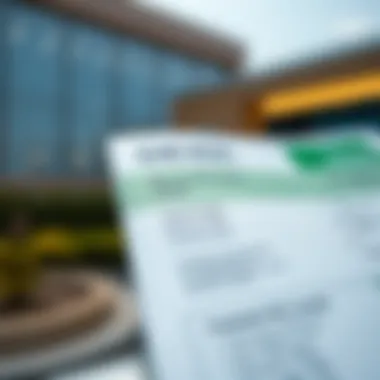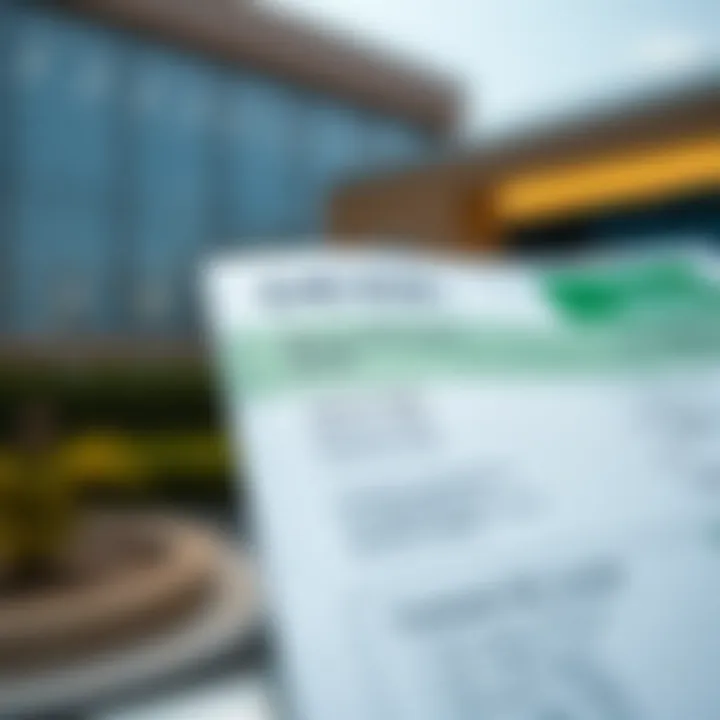Guide to Transferring Your DEWA Account Seamlessly


Intro
Transferring a DEWA account can seem like a daunting task for many, yet it’s a necessary process for anyone moving into a new residence or altering ownership. Its importance stretches not just to individuals, but also to real estate investors and professionals navigating the dynamic landscape of Dubai's property market. Having the right information at your fingertips can make all the difference. This guide serves to clarify each step in the transfer process, making it easier for you to get settled into your new abode without unnecessary hiccups.
Whether you’re a homeowner, investor, or realtor, a smooth utility transfer is paramount in ensuring that the transition to a new property goes without a hitch. In the bustling world of Dubai real estate, clarity is key—understanding how to manage utility accounts, including DEWA, is part and parcel of efficient property management.
Before diving headfirst into the nitty-gritty of the transfer process, let’s first peek into the current market insights which affect property ownership and, by extension, utility transfers.
Understanding DEWA Account Ownership
Understanding the ownership of a Dubai Electricity and Water Authority (DEWA) account is a crucial first step for anyone looking to transfer their utility account. This ownership underlies many aspects of property management, particularly in a bustling city like Dubai where changes in residence or property ownership can happen swiftly. When you own a property, your DEWA account becomes a part of that investment landscape, reflecting your energy consumption and water usage, which in turn influences your monthly bills. Thus, grasping the intricacies of this ownership is not just an academic exercise; it’s key to managing your financial obligations effectively and smoothly navigating any transitions you wish to make.
Definition of a DEWA Account
A DEWA account represents an agreement between the customer and the authority to supply electricity and water services. It acts as an official record, documenting the usage patterns and payment history of an individual or entity. Each account is uniquely linked to a specific property, creating a clear connection between the utility services being provided and the customer who is financially responsible for those services. This account is not just an abstract concept; it defines your relationship with energy providers in Dubai and can dictate how your utilities are managed and billed.
Additionally, the account holds the responsibility for payments, ensuring that the services remain uninterrupted. Without a proper understanding of what a DEWA account entails, one risks facing unnecessary complications during property transitions or account transfers.
Importance of Account Ownership in Dubai's Real Estate
In the context of Dubai’s real estate market, the importance of account ownership cannot be overstated. Property ownership is deeply intertwined with the concept of utility account management. When properties change hands—whether sold, inherited, or rented—the corresponding DEWA accounts must be adjusted to reflect the new ownership.
Moreover, maintaining a good track record with your account can significantly influence your standing in the real estate community. Here are a few points that highlight this significance:
- Credibility: A well-maintained DEWA account signals to potential buyers or tenants that you are serious about your responsibilities.
- Financial Impact: Outstanding balances on an account can lead to complications and may even hinder future real estate transactions. Ensuring that your account is up to date can streamline future dealings.
- Service Continuity: Understanding your account aids in ensuring continuity of services, which is vital in a city known for its fast-paced lifestyle.
Having clarity on ownership not only ensures compliance with local regulations but also sets the stage for a smoother transfer process, should the need arise. Ultimately, a solid grasp of what a DEWA account encompasses and its implications can save time, money, and hassle, enabling a more strategic approach to management and ownership in Dubai's dynamic real estate sector.
Reasons for Transferring a DEWA Account
Transferring a DEWA account is not just a procedural necessity; it opens a door to significant benefits that can impact homeowners, tenants, and investors alike. In the bustling and dynamic property market of Dubai, the ownership of electricity and water services plays a pivotal role. Whether it's moving to a new property or changing residency, understanding the reasons behind transferring your DEWA account helps make this shift smooth and unproblematic.
Change of Property Ownership
When a property is bought or sold in Dubai, the transfer of ownership is usually accompanied by the need to reassign the DEWA account. This is crucial for several reasons:
- Legal Compliance: DEWA mandates that utilities must be in the name of the account holders who reside in the property. Failing to do so can lead to legal complications.
- Responsibility for Bills: The new owner must be responsible for ongoing utility bills after the purchase goes through. This ensures clarity in financial accountability and prevents disputes over outstanding debts linked to the previous owner.
- Personalization of Services: Different homeowners may have varied needs. A new account ensures that services can be tailored to the requirements of the current owner, such as adjusting service type or consumption level.
It's wise for buyers to remember that the timely transfer of a DEWA account can prevent penalties and other fees associated with service disruptions.
Change in Residency
Life in Dubai can be as transient as it is vibrant. If you're shifting residency—whether to a new apartment or city—transferring your DEWA account becomes a priority. This scenario often presents a different array of considerations:
- Utility Continuity: Different locations might come with differing rates or utility setups. Transferring your account ensures minimal disruption to your services.
- Address Updates: Having accurate records of where you live enhances communication with DEWA and ensures that you receive timely notifications, bills, and updates. An updated account maintains effective lines of communication between you and your utility provider.
- Potential for Improved Services: Depending on the new location, you might benefit from enhancements in service quality that better suit your personal needs. Additionally, new residential areas may offer modern amenities that weren't available in your previous location.
Understanding the significance of account transfer following a residency change can save one from headaches that often arise from utility mismanagement.
Other Personal Circumstances
Life's unpredictable nature means that there are countless other situations where transferring a DEWA account makes sense. Here are a few personal circumstances that might lead to such a decision:
- Family Changes: Events like marriage, divorce, or even the addition of new household members can influence utility account management. A shared account may no longer be suitable in these cases.
- Job Relocation: Professionals who need to shift their workplace may find it simpler to transfer their utility accounts to reflect changes in living circumstances, particularly if relocation efforts include moving to a different emirate or residential arrangement.
- Financial Situation: Sometimes, changing financial circumstances compel individuals to downsize or shift properties. It’s essential to ensure that your utilities are aligned with your current living situation.
In essence, knowing when and why to transfer your DEWA account can not only facilitate easier transitions but also enhance your overall living experience in Dubai. Recognizing the nuances involved in this process helps mitigate frustrations that often accompany significant life changes.
Eligibility Criteria for DEWA Account Transfer
Transferring a DEWA account isn't as straightforward as one might hope. It's essential to understand the eligibility criteria involved in this process. Understanding who can transfer an account and the associated account status will save you from potential pitfalls down the road. This section addresses the foundational elements that govern the transfer, ensuring that both parties involved – whether the current account holder or the new one – are on solid ground.
Who Can Transfer the Account?
In the bustling real estate landscape of Dubai, ownership changes hands frequently. However, not just anyone can step in and take over a DEWA account. Transfer eligibility typically revolves around ownership status and residency. Here’s a closer look:
- Property Ownership: The new account holder must have an ownership title deed for the property associated with the account. If you're a tenant, you can’t just waltz in and expect to claim the account.
- Legal Representatives: In some cases, if the current owner cannot complete the transfer, a legal representative may undertake the process. However, they will need proper documentation to verify their authority.
- Name Change Scenarios: If a name change has occurred (due to marriage, for instance), the individual must also provide proof of identification to reflect the update in their documentation.
This originally established eligibility ensures that the right individuals access utility services while safeguarding the interests of all parties involved. If you don’t fit the criteria, you might find yourself stuck navigating complex hurdles.
Pending Bills and Account Status
Always remember, account status matters a great deal when initiating a transfer. DEWA is less than forgiving when it comes to unresolved bills. Here’s what you should know:
- Outstanding Payments: Before proceeding, check if the current owner has any unpaid dues. An account with pending balances can delay or complicate the transfer process. It's often better to settle these bills to foster a smooth transition.
- Inactive Accounts: An important note for prospective recipients—if the DEWA account is inactive for a certain period, it's crucial to reactivate it before transferring.
"It’s better to enter with your eyes wide open than to end up in the deep end of account complications."
- Account History: A record of late payments or disconnections can potentially raise flags. Consider discussing this with DEWA beforehand to ensure that there are no hidden surprises that could impede the transfer.
Ensuring that all previous outstanding balances are cleared and that the account status is active can make the transfer process far less cumbersome.


Pre-Transfer Steps and Considerations
Transferring your DEWA account isn’t just about completing a few forms. It requires careful thought and preparation to ensure everything flows smoothly. Getting the pre-transfer steps right can shape not just your experience but also safeguard your utility services. Rushing into it can lead to unnecessary complications, and nobody wants that. By understanding what to do before the transfer, you're setting yourself up for success.
Gather Necessary Documents
Before you begin the transfer process, making sure you have the right documents is non-negotiable. It’s like preparing for a trip; without your passport, you're not going anywhere. Here’s a breakdown of what's necessary and the benefits of having everything sorted.
Identification Documents
Identification is at the heart of the transfer process. You’ll typically need a form of ID, like a passport or Emirates ID. The key characteristic of these documents is that they establish your identity without a shadow of a doubt, which helps DEWA confirm you are the legitimate account holder. This is a popular choice due to its universal acceptance in all transactions.
However, there’s a unique catch: ensure that your documents are up to date. An expired ID can throw a wrench in the works, leading to delays. Plus, having updated identification gives a sense of credibility to your transfer request, making the process easier.
Proof of Ownership
Proof of ownership is equally crucial, demonstrating you have a legitimate claim to the property associated with the DEWA account. This could be a title deed or a lease agreement. The primary appeal of these documents lies in their ability to substantiate your right to the account, making them indispensable.
In addition to solidifying your claim, these documents can protect you from any potential disputes that might arise over ownership. Clearly, having evidence like this is a strategic advantage when making your case to DEWA.
No Objection Certificate
Lastly, the No Objection Certificate (NOC) can play a significant role, especially in cases involving rental properties or shared ownership. It ensures that the current owner or landlord has no qualms about transferring the account. The NOC stands out because it’s essentially a go-ahead from all involved parties, calming any potential storms before they hit.
Having a detailed NOC not only speeds up the transfer but also mitigates any tension between previous and new owners. This feature is particularly beneficial, as it reassures all parties that the rights of existing contracts are honored.
Check Outstanding Balances
Before initiating the transfer, checking for any outstanding balances on the previous account is smart business. Settling these bills upfront saves headaches later and makes the transfer smoother. When outstanding balances exist, they can delay the process and could lead to complications down the road. Clarity around your account can prevent disruptions to your utility services.
Consult with DEWA Customer Service
Finally, consulting DEWA customer service for any specific requirements or clarifications is crucial. They can provide insights tailored to your situation, helping ensure you don’t miss any critical steps. Just think of it as a safety net; it's always better to be safe than sorry.
In short, these pre-transfer steps lay a solid foundation. Addressing each element with diligence can save you stress, time, and possibly some funds during the transfer process.
"Preparation is the key to success."
Taking a moment to gather everything needed can enhance the overall experience of transferring your DEWA account.
Steps to Initiate the Transfer Process
Initiating the transfer of a DEWA account is a critical step in ensuring a smooth transition when ownership of property changes hands or when a resident moves. This part of the process underscores the necessity of formal communication and documentation, which lays the groundwork for a successful account handover. Getting the steps right not only speeds up the transfer but also minimizes the chance of complications later on. Here, we’ll explore three essential components that make up this initiation process: contacting DEWA, submitting the transfer request form, and coordinating with the incoming tenant or owner.
Contacting DEWA
The first step to initiating a transfer is to get in touch with the Dubai Electricity and Water Authority. This isn’t just about picking up the phone or sending an email; it’s about establishing a connection with the right department that handles account transfers. DEWA has various channels through which you can reach them, including their official website, customer service numbers, or even in-person visits to their service centers.
Tip: Using the DEWA mobile app can streamline this process by providing convenient access to their services, including account management options.
When contacting DEWA, it is advisable to have your current account number handy as well as any identification documents ready. This would set the tone for an efficient conversation where you can clearly express your intent to transfer the account. Additionally, be prepared for a series of questions related to your account and the reasons for the transfer. These essentials help staff assist you more effectively.
Submitting Transfer Request Form
Once you've established contact with DEWA, the next logical step is submitting the transfer request form. This form can often be downloaded from the DEWA website or obtained at a service center. It typically requires basic information about both the current and incoming account holders, property details, and signatures.
Here’s what to pay attention to:
- Completeness: Ensure that all fields are filled out correctly. An incomplete form can lead to delays.
- Accuracy: Double-check the information entered for accuracy. Typos could mean matching issues later in the process.
- Signature: Both the current account holder and incoming tenant or owner usually need to sign the form. Make sure this is done in the right place.
Submitting this form is a formal declaration of intent to change the account ownership. It signals that all parties are on board and ready for the transition, laying the foundation for the next steps.
Incoming Tenant/Owner Coordination
The final piece of the transfer initiation puzzle revolves around effective coordination between the current account holder and the incoming tenant or owner. This step is paramount because clear communication between parties ensures that everyone understands timelines, responsibilities, and any nuances that may affect the transfer.
- Coaching: It’s beneficial for the outgoing owner to guide the incoming tenant or owner on any unique aspects of the account that they should be aware of. For instance, creating awareness about any special services tied to the account or specific billing cycles can be very helpful.
- Confirmation: After submitting the transfer request, both parties should confirm when the transfer will take effect. It’s vital to know when the new account holder can expect to take over the utilities.
- Follow-Up: Keeping lines of communication open can help prevent misunderstandings. A follow-up with DEWA may be necessary to confirm that the process is moving along smoothly.
By addressing these three critical areas, the process of initiating a DEWA account transfer becomes much more manageable. Careful planning and thorough communication are keys to ensuring everything flows seamlessly. Getting this part right can save time and reduce headache down the line, allowing everyone involved to settle into their new circumstances with fewer bumps along the way.
Documentation Required for the Transfer
When you’re looking to transfer your DEWA account, the weight of documentation cannot be overstated. This paperwork acts as the backbone of the entire process. If you're shifting properties or handing over account responsibilities to a new tenant or owner, having the right documents ready is essential not just for compliance with local regulations but also to safeguard your interests. Lacking necessary documentation can throw a wrench into what should be a straightforward process, making understanding these requirements crucial.
Identification and Authorization
First things first, identification matters. Each individual involved must present valid forms of identification. This typically includes a passport or UAE national ID. These documents confirm your identity and ensure that the DEWA can process the transfer without a hitch. Not only do they establish who you are, but they also help in maintaining the integrity of account ownership.
Furthermore, if you're acting on behalf of someone else, an authorization letter might come into play. This letter acts like a golden ticket, giving you the green light to conduct the transfer on another person's behalf. Without it, you might just be spinning your wheels. Always have these on hand to streamline the process and avoid delays.
Proof of Relationship (If Applicable)


In situations where the account is being transferred between family members or related parties, proof of relationship might be necessary. This could be anything from a marriage certificate to a birth certificate, depending on the situation. Such documents provide the DEWA with the clarity they need about the connection between the individuals involved in the transfer.
Establishing kinship or partnership gives an additional layer of legitimacy to the transfer request. If you're transferring the account to a spouse or close relative, having these papers can make the process smoother. It also prevents misunderstandings that could lead to disputes down the line. You want to enter this transfer fully equipped, not having to scramble at the last moment.
Property-related Documents
Last but certainly not least, property-related documents hold significant importance in the transfer process. This category can include the title deed, an existing lease agreement, or a no-objection certificate from the landlord or property management. Each of these documents works like a key to unlock the potential for a smooth transfer.
The title deed is essential as it shows proof of ownership. An existing lease agreement, especially for tenants, clarifies the terms under which they occupy the property. Lastly, a no-objection certificate indicates that the current owner has no issues with the transfer. All these documents tie into one another to paint a clear picture of the ownership landscape, which is what DEWA needs to proceed effectively.
"Understanding the documentation requirement is a pivotal step in navigating the DEWA account transfer process seamlessly.
Overall, ensuring that you have all the necessary documentation—identification, proof of relationship when relevant, and property-related documents—paves the way for a successful DEWA account transfer. Missing any piece of this puzzle can lead to delays, frustrations, and potential roadblocks in completing your account transfer smoothly.
Potential Fees Involved in Account Transfer
When it comes to managing your DEWA account, understanding the associated fees is key. Whether you’re handing over utilities due to a sale or simply changing residences, there are costs tied to transferring the account. Knowing these potential fees helps you prepare financially, avoiding any unwelcome surprises. This understanding is particularly vital for investors and homeowners, who deal with property matters regularly.
Overview of Transfer Fees
Transfer fees are a fundamental component of the DEWA account transfer process. Typically, these fees can fluctuate based on the type of property or the current account status. The fees cover the administrative costs incurred by DEWA during the transfer, ensuring smooth processing. In most cases, you can expect to pay anywhere from 100 AED to 300 AED, depending on various factors, including the urgency of your request and the kind of service you require.
Here’s a simple breakdown of the costs:
- Standard transfer fee: Usually around 100 AED
- Express transfer fee: May range up to 300 AED for quicker processing
It’s wise to consult DEWA’s official website or reach out to their customer service to get the most accurate and up-to-date information concerning the transfer fees applicable to your specific situation.
Other Associated Charges
Apart from the transfer fee itself, there are additional charges you might need to consider, which could add up if you’re not careful. These can include:
- Outstanding balances: Before the transfer can be finalized, any unpaid bills must be settled. This is essential as DEWA will not proceed with the transfer if there are dues on the account.
- No Objection Certificate (NOC): If applicable, obtaining an NOC from the landlord or property management may require a fee. This document confirms that they consent to the transfer, so it’s often necessary when dealing with rental properties.
- Service charges: Some transactions might entail service fees, especially if additional documentation is needed or if you require particular technical support during the transfer process.
Remember, it’s best to have all your dues settled before initiating a transfer to avoid complications later.
Be sure to factor these potential fees into your budget when planning to transfer your DEWA account. Knowing what costs to expect can help you navigate the transfer without hitches, ensuring a seamless transition of services.
Timeframe for DEWA Account Transfer
Transferring a DEWA account is more than just paperwork; it’s a critical process that impacts your living arrangements in Dubai. Getting the timing right can save you from unnecessary headaches. Understanding the timeframe for the transfer helps ensure that both the seller and buyer, or the current account holder and new resident, are on the same page. Knowing how long it might take influences planning for utilities and fitting into a new living situation smoothly.
Processing Times Explained
When it comes to the nitty-gritty of processing times for a DEWA account transfer, things can get a bit hairy. Generally, the actual transfer process can take anywhere from a few working days to a couple of weeks. DEWA aims for efficiency, but how quickly you achieve that sweet "all done" status can vary based on multiple factors.
After you've submitted all required documents—a process that itself can take some time if you don't have everything at hand—you may have to wait for DEWA’s backend system to crunch the numbers and verify the information. This generally happens within three to five business days upon submission, provided everything is in order. It's wise to keep an eye on your email because that's where you'll get confirmation or any requests for further information.
Factors Affecting Transfer Duration
Not all transfers are equal. Several variables can either expedite or prolong the process. Here are some key factors that come into play:
- Completeness of Documentation: If there are even minor discrepancies or missing papers, the process can stall. Making sure you have all your documents in order can shave days off your wait.
- Outstanding Bills: If your current account has any unpaid dues, DEWA might delay the transfer until those are settled. Hence, it's wise to clear any dues beforehand to keep things moving.
- Seasonal Demand: Transactions tend to surge during particular times of the year, particularly when rental or sales seasons peak. During these times, expect longer waiting periods as staff are inundated with requests.
- Customer Service Wait Times: If there are any inquiries or clarifications needed, you may find yourself waiting in line, whether it’s over the phone or at the local DEWA office. Patience is key here.
The intricacies of transferring your DEWA account can be a puzzle, but being aware of these aspects helps you navigate the timeline more effectively.
"A stitch in time saves nine." Planning your transfer process can ease many future troubles, keeping your utilities running smoothly as you transition into a new chapter.
Common Challenges and Solutions
Transferring a DEWA account can be a smooth sail for some, while others might run into a few bumps along the way. Recognizing these challenges and nailing down potential solutions can make all the difference. Understanding common issues not only prepares you but also arms you with the necessary knowledge to navigate through obstacles should they arise. This ensures continuity of utilities which is essential for any property owner or tenant. Here’s a closer look at a few typical struggles during this process and how to tackle them.
Delays in Processing
One of the most frequent headaches people encounter when transferring their DEWA accounts is delays in processing. Such delays can stem from various reasons. First off, if the transfer request isn’t complete with all required documents, DEWA may hit the brakes. It’s like trying to drive without your seatbelt on – they won’t let you go until everything checks out.
To minimize the chances of running into processing delays:
- Double-check that you’ve gathered every necessary document before submitting.
- Regularly follow up with DEWA to ensure the request is moving along and no additional information is needed.
Patience is key because sometimes it takes a little longer than anticipated. However, staying proactive often helps keep everything on track.
Missing Documentation
Nothing can stop a transfer dead in its tracks like missing paperwork. Sadly, this is a common pitfall for many. Often, folks just aren’t aware of what’s required, leading to last-minute scrambles and stress.
To keep that from happening:
- Make a checklist of all documents required such as identification, property ownership proof, and No Objection Certificates. This way, you won’t miss a beat.
- If you're uncertain about something, don’t hesitate to reach out to DEWA’s customer service. They can guide you based on your specific situation.
Remember, being organized isn’t just a nice-to-have, it’s a must-have.


Disputes Over Charges
Another issue that can surface is disputes over charges, especially if there are unexpected fees or fees that don’t add up. This can create tension between previous and new account holders, which is far from ideal. Often, these disputes arise due to a mismatch in billing periods or outstanding charges not being fully cleared before the transfer.
To handle these potential disputes efficiently:
- Prior to initiating the transfer, ensure all previous bills are settled. You don’t want any lingering surprises.
- Keep a line of communication open with all parties involved. If discrepancies arise, calmly discuss them so they can be resolved promptly.
As a general rule, being upfront about expenses can save everyone involved a lot of stress down the line.
Finalizing the Transfer
Once you've navigated the tumultuous waters of transferring your DEWA account, the final steps are not to be overlooked. Finalizing the transfer is crucial because it ensures everything is wrapped up neatly. Think of it as tidying your house after moving; it’s all about making sure you're settled in the new space correctly. This phase isn’t just about completing paperwork; it's about confirming your establishment in a new role as the account holder while ensuring no loose ends hang around.
Confirmation of Transfer Completion
Confirmation of transfer completion serves as the first checkmark on your to-do list after the transfer process. Once DEWA has processed your request, you should receive a notification—this can come in the form of an email or a text message. It's like waiting for the green light at a traffic signal; you don’t want to move until you see it.
However, don’t just take their word for it. Access your account online to check that all details reflect your name and that there are no discrepancies with previous billing amounts or any unresolved complaints. If anything seems amiss, don’t hesitate to get in touch with DEWA customer service for clarification. Prompt action can mean the difference between a seamless transition and a protracted hassle.
Updating Personal Records
After receiving confirmation, the next step involves updating your personal records. This is where some may let things slide, thinking it’s not a big deal. But just like in the real estate game, every bit of paperwork matters. Update not only your personal information with DEWA but ensure that any other relevant bodies receive the notice of this change. This can be particularly important if you’ve also moved your mailing address.
Consider updating documents such as:
- Mailing Address: Ensure bills and communications reach you.
- Identification Records: If needed, reflect your new address on official IDs.
- Financial Institutions: If your DEWA account has any relation to your banking, update them, too.
Failing to make these changes can lead to miscommunication and unexpected delays in service. Clear records pave the way for less hassle—nobody likes a surprise bill showing up at the old address.
"Consistency in records not only builds trust but also ensures a smoother trail in any transaction."
In summary, when you finalize your DEWA account transfer, prioritize confirming the completion and updating all personal records diligently. These steps ensure that you not only adhere to regulations but also smooth the ongoing management of your utility services. It’s all about laying down solid roots in your new situation.
Post-Transfer Responsibilities
Once the DEWA account transfer is complete, the new account holder steps into a crucial role with specific responsibilities. These responsibilities are not merely formalities but essential actions that uphold the integrity of utility service management and ensure a smooth continuation of services. Understanding these obligations can prevent misunderstandings and possible service disruptions, making this guide vital for both new residents and property owners.
Understanding New Account Management
After the transfer, the new custodian of the DEWA account needs to familiarize themselves with the management of their utility services. This means they must learn how to navigate the DEWA customer portal effectively. This portal allows account holders to monitor usage, pay bills, check service interruptions, and update personal information, among other functionalities.
- Login and Password Management: First up, getting access to the online portal requires a login ID and password. It’s essential to keep this secure, as it contains sensitive information about account status and billing.
- Bill Payment: Regular bill payments should be a priority to avoid any late fees or interruptions in service. Setting up a reminder on your phone or an automatic payment can mitigate the risk of falling behind.
- Energy Consumption Monitoring: Understanding how much electricity and water you are using can aid in managing expenses. Tracking usage trends can help identify opportunities to save money, especially in hot months when electricity bills can skyrocket.
Continued Communication with DEWA
Keeping the lines of communication open with DEWA is imperative for continued quality service. As needs change or if any issues arise, being prompt in communication could save time and resource.
- Regular Check-Ins: It’s wise to stay in touch with DEWA, especially in the early days post-transfer. Whether it’s questions about bills or service inquiries, don’t hesitate to reach out. The customer service can provide valuable insights and solutions.
- Service Notifications: Registering for updates related to interruptions or maintenance can keep you ahead of any potential issues. Often, DEWA provides notifications about scheduled outages, so staying informed is beneficial.
- Feedback and Queries: Should you have any concerns about service quality or billing discrepancies, don’t hold back in voicing these to DEWA. Promptly addressing any feedback helps in refining services and ensures that your experience is satisfactory.
Keeping an eye on your usage and communicating well with DEWA can help avoid complications that come with account mismanagement.
In essence, while the initial transfer of a DEWA account might seem straightforward, the responsibilities that follow require diligence and active management. By understanding new account management and maintaining open communication, the new account holder can ensure their utility services run like a well-oiled machine, avoiding unnecessary hiccups along the way.
Frequently Asked Questions
When it comes to transferring a DEWA account, many questions often emerge. This section serves as a valuable resource for potential concerns and clarifications. Understanding these frequently asked questions not only demystifies the transfer process but also provides reassurance to those unfamiliar with the procedures. Addressing common queries about account transfer ensures that both property owners and tenants navigate their responsibilities and rights effectively.
Can Transfer My DEWA Account Online?
Yes, it is possible to initiate the transfer of your DEWA account online. DEWA has embraced digital solutions to simplify processes. You can access the DEWA customer portal or mobile app to submit a transfer request. In case you are not familiar with the online process, you will need to create an account on their platform. This option allows for faster service with fewer manual steps. However, ensure to have all necessary documents handy, as you might need to upload them during the online submission process.
What If There Are Outstanding Bills?
Outstanding bills can complicate the transfer of your DEWA account. Ideally, you should clear any dues before initiating the transfer. DEWA typically requires all bills to be settled to avoid disputes and ensure a seamless transition. If you cannot settle the bills for any reason, you should contact DEWA customer service to discuss potential solutions. Ignoring outstanding balances may delay the transfer and create future issues for the new account holder. It’s crucial that all parties are crystal clear about any financial responsibilities before the process moves forward.
Who to Contact for Issues?
For any issues that arise during the account transfer process, reaching out to DEWA customer service is the best move. They are equipped to handle queries and solve problems. You can call them directly or use the online chat feature on the DEWA website. Those who prefer in-person assistance can visit one of the DEWA service centers. It’s essential to have your account information ready when contacting them, as it can expedite assistance. If you encounter complications independent of DEWA, such as disputes with a previous owner or tenant, legal advice might also be warranted.
The key to a smooth transfer is communication and preparation. Stay proactive and engaged throughout the process.
Epilogue
In today’s world, where residential dynamics are constantly changing, understanding how to manage the transfer of a Dubai Electricity and Water Authority (DEWA) account is paramount. This aspect of relocating or changing property ownership does not just hinge on logistical convenience; it carries significant implications for residents and investors alike. By mastering this process, individuals can ensure their utility services remain uninterrupted, which in turn fosters continuity and stability in their living arrangements.
The Importance of Understanding the Process
Grasping the ins and outs of transferring a DEWA account is essential for anyone engaging in property transactions in Dubai. It's more than just filling out forms and making a few calls. Account transfer affects utility services directly; any hiccup in this transition could lead to disruptions that may complicate daily life. Understanding the process also involves knowing the documentation needed, the potential fees, the expected timeframe, and the various parties involved in ensuring a smooth transition. Moreover, being well-informed allows individuals to avoid pitfalls that could lead to additional charges or service interruptions. This knowledge empowers homeowners and investors to navigate the complex landscape of utility management with confidence.
Encouragement to Seek Assistance When Needed
Navigating through the procedural maze of a DEWA account transfer can feel overwhelming, especially for first-time movers or those unfamiliar with the local regulations. Therefore, it is wise to seek help whenever there's uncertainty. Whether it’s reaching out to DEWA’s customer service for clarity or consulting with a real estate expert, leveraging available resources can enhance the efficiency of the process. Remember, it’s better to ask than to assume; a minor misstep can lead to major inconveniences. One could say, a little knowledge is a dangerous thing, but a little help can certainly go a long way.
"In a world where change is the only constant, being informed about your responsibilities eases the journey."
In summation, whether you are a homeowner, an investor, or simply someone moving in or out, tackling the DEWA account transfer process with a solid understanding—and knowing when to reach out for assistance—will significantly contribute to a seamless transition in the bustling landscape of Dubai's properties. For more detailed guidelines and support, consider visiting official resources like DEWA's official website or local forums that discuss experiences and tips regarding such matters.







